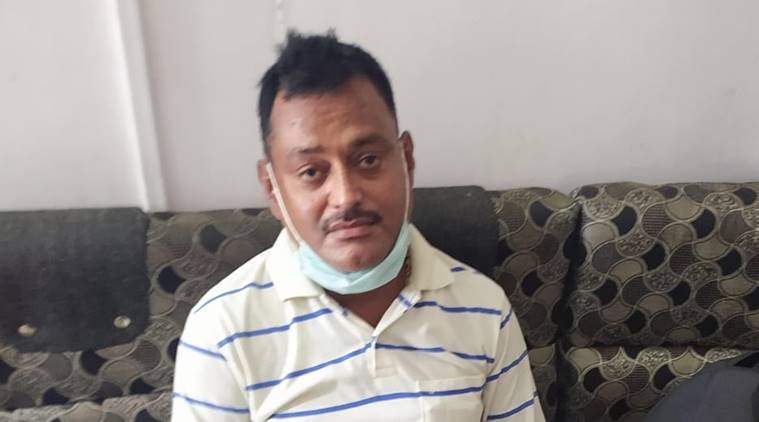 Vikas Dubey after his arrest Thursday.
Vikas Dubey after his arrest Thursday.
Vikas Dubey was a Frankenstein waiting to happen. When I joined the police in 1953, I could not have dreamt that such a criminal would be created in India. There were criminals in those days also, and there were gang lords. But they were afraid of the police and respected their authority. No criminal would dare to attack the police, least of all ambush and decimate a police party led by a senior officer.
How did Vikas Dubey, a local hoodlum whose territory did not extend beyond a couple of districts in Uttar Pradesh, lose all respect for the police and authority of the state? The answer is not difficult to formulate. All the classical signs of decay of the judicial system, because of the politicisation of the institutions of governance, were long visible to even those outside this system.
The police is the first port of call for any citizen who wants to put the criminal law in motion. The prosecutor, defence lawyers and judges come next in the chronological order. If the first stakeholder in the system is influenced by money or by political pressure, the complaint itself is jinxed. The SHO will hum and haw, offer 20 or more reasons for avoiding registering the FIR that is needed to put the law in motion.
If the FIR is indeed registered, the fate of the investigation is doomed from the start. Statements of witnesses will not be recorded correctly or enough lacunae will be left for the defence to exploit. The SHO and investigation officers often decide to protect the offender due to monetary inducement or because they feel that it is in their interests to please their political masters. If an officer has secured his posting through a patron with political interests, as is routinely happening these days, you can be assured that the culprits will get away if they approach the right person for protection.
The politicians in charge soon after Independence did not interfere in crime investigations. The change happened four or more decades later, at least in Maharashtra of which I have personal experience. I am not sure of the states in north India. Perhaps, the process of political meddling and patronage afforded to corrupt officials may have started earlier there. But in Mumbai, I can affirm that the nexus between criminals, the police and the politicians was visible only in the Eighties. Even then, the political class was not brazen about patronage.
The criminals offer not only money to fight elections, they also provide muscle power. The temptation to accept their services is so great that most political parties gratefully accept their help. Since they control the appointments and postings, they oblige police officers who seek their intervention. Once the officers are posted through the political route they are obliged to their patron. The politicisation of the force is complete if lobbying plays a role in the appointment of the police chief.
This is what is happening in all the states of the country. In my home state, the politicians still respect officers with integrity and self-respect — the ones who keep corruption in check. Criminals have less scope to operate when one leg of the three-legged stool is wobbly. If the police is led by self-respecting individuals, there is a much greater chance that criminals will not be so emboldened. But if politicians are powerful personalities who have their way in all aspects of policing, the political class decides postings and transfers, and ultimately the performance of the force.
It is necessary to elaborate this process of politicisation of the police force to explain how principles of good governance are discarded and policemen become marauders themselves or simply allow marauders to operate. Vikas Dubey, who did not give a tuppence for the men in khaki and flourished all these years because of political and police patronage, would not have risen in the hierarchy of criminals if he had been bottled up in the infancy of his chosen career.
The National Police Commission had seen the signs on the wall. In the early Eighties, it had recommended a process of selecting top officers to man the cutting-edge leadership jobs in the force. The Supreme Court had given its imprimatur to its suggestions. But no political party is willing to loosen its stranglehold on policing. And until this stranglehold is loosened, Vikas Dubeys will appear on the scene more frequently.
The end of Dubey came in a manner many people had apprehended. He died while trying to escape from a vehicle in which he was being transported, which toppled over and yet allowed Dubey to emerge unhurt. Nobody will accept this explanation but even then, a lot of people are likely to applaud the police and the UP Chief Minister Yogi Adityanath, who had openly boasted of controlling crime by the encounter method. He forgets that by using this shortcut he is ensuring the rise of enterprising policemen, who have become law breakers instead of law keepers.
The writer, a retired IPS officer, was Mumbai police commissioner, DGP Gujarat and Punjab
📣 The Indian Express is now on Telegram. Click here to join our channel (@indianexpress) and stay updated with the latest headlines
For all the latest Opinion News, download Indian Express App.
© The Indian Express (P) Ltd
"creation" - Google News
July 11, 2020 at 05:30AM
https://ift.tt/2ZiySlW
The creation of Vikas Dubey - The Indian Express
"creation" - Google News
https://ift.tt/39MUE4f
https://ift.tt/3bZVhYX
Bagikan Berita Ini














0 Response to "The creation of Vikas Dubey - The Indian Express"
Post a Comment